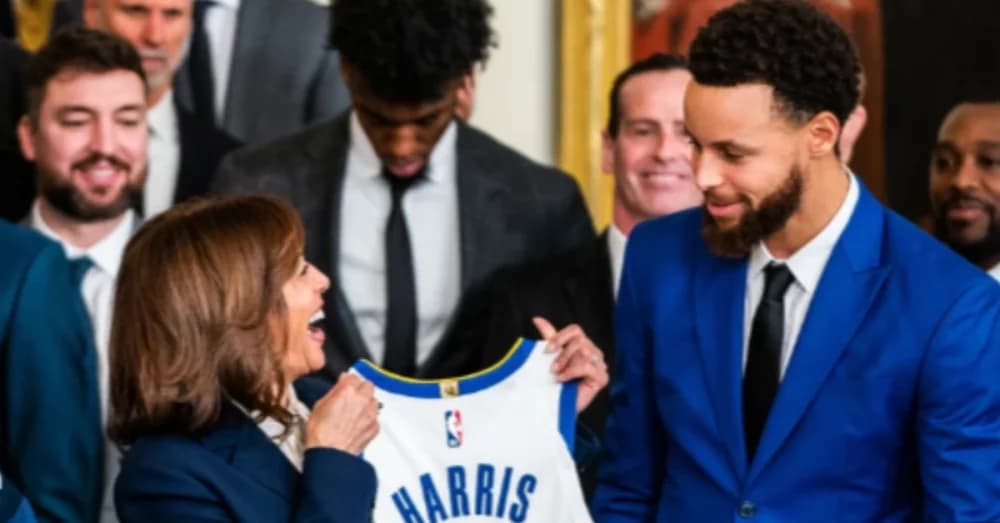NBA Star Steph Curry Faces Fierce Criticism After Endorsing Kamala Harris: Faith Under Fire

Four-time NBA champion and global basketball icon, Steph Curry, recently stirred the political pot once again by endorsing Vice President Kamala Harris for the U.S. presidency. The endorsement, which comes at a pivotal time in American politics ahead of the 2024 election, has ignited a firestorm of backlash, particularly from conservative circles. Curry, who has long been open about his faith and Christian values, found himself under intense scrutiny, not for his basketball prowess, but for his political views and religious beliefs.
On Saturday morning, NBA podcaster TJ Moe, co-host of the “Fearless” podcast with former ESPN personality Jason Whitlock, made headlines with his scathing critique of Curry’s endorsement. Moe, who is known for his controversial takes, didn’t just criticize Curry’s political stance—he went further, questioning the legitimacy of Curry’s Christian faith.
Moe’s claim? That Curry’s support of Kamala Harris, who has publicly supported pro-choice policies, directly contradicts the fundamental teachings of Christianity. In Moe’s eyes, this makes Steph Curry unworthy of the Christian label.
“Steph Curry is not a Christian, and everybody should stop pretending so,” Moe stated on his podcast. “We should stop talking about him like he is a Christian. He didn’t come out and say, ‘Hey, look, tax policy is a big deal to me. And, you know, the Bible is not that clear on it, but I’m a Christian.’ He didn’t say that. He came out defending one policy: abortion. That’s what he cares about.”
“Steph Curry is not a Christian, and everybody should stop pretending he is… he’s decided that this is the path that he wants to take.” – @TJMoe28 on Steph Curry’s support of abortion and Kamala Harris pic.twitter.com/mrrkhmgX5R
— Jason Whitlock (@WhitlockJason) September 7, 2024
These pointed remarks, while inflammatory, resonate with a segment of the population that often views politics through the lens of religious doctrine. The debate about whether a public figure can truly embody Christian principles while supporting pro-choice candidates has long been a divisive issue. In Steph Curry’s case, his endorsement of Kamala Harris, a Democrat who supports abortion rights, has cast Steph Curry into the center of this age-old debate.
Steph Curry, who has always carried himself with grace on and off the court, did not shy away from explaining his position. During an interview with Bloomberg TV at the 2024 Curry Cup golf tournament, Steph Curry addressed his endorsement of Kamala Harris, diving into the reasons behind his decision. In his typically calm and thoughtful manner, Curry emphasized that his political views stem from his personal convictions, which he believes are rooted in decency and humanity.
“First, it was a conviction of what you believe, being active in it, and actually publicly endorsing her. We’ve been a part of the DNC back in 2020 as well. I’ve approached everything with decency and humanity—it’s not like I’m out here casting flames at the other side. This is what I believe,” Curry said, referencing his ongoing support of the Democratic Party.
Curry’s stance reflects a growing trend among younger public figures who feel that their faith does not have to be mutually exclusive with their political views. His explanation was a far cry from the politically neutral approach famously taken by basketball legend Michael Jordan, who chose to remain silent during a contentious U.S. Senate race in North Carolina in 1990. Jordan’s reasoning at the time, “Republicans buy sneakers too,” has gone down in history as a statement that encapsulates the risks of athletes wading into politics.
In contrast, Steph Curry has taken the opposite approach. He is fully aware of the backlash his endorsements might trigger but chooses to stand firm in his beliefs. His endorsement of Kamala Harris is not just a political statement but a reflection of his desire to use his platform for causes he deems important.
TJ Moe’s attack on Curry’s faith is emblematic of the broader intersection of politics and religion in America. For many, supporting a pro-choice candidate like Kamala Harris raises questions about how deeply one’s religious convictions run. For Moe and others, abortion is the non-negotiable issue that defines the boundary between being a “true” Christian and merely professing the faith. In his eyes, Curry’s public support for Harris disqualifies him from claiming to live a Christian life, despite Curry’s regular affirmations of faith.
But is Moe’s critique fair? Curry has never hidden his religious beliefs. He often points to his faith as the guiding force in his life, both professionally and personally. His infamous “I can do all things” motto, derived from Philippians 4:13, has become part of his personal brand. However, Curry’s brand of Christianity, much like many modern believers, may be more nuanced than the rigid doctrines Moe subscribes to.
For some, Curry represents a new generation of Christians who believe that faith can coexist with political ideologies that are more progressive on issues like women’s rights and LGBTQ+ rights. Moe’s attack, though not unique, reflects a certain brand of gatekeeping in religious circles—one that dictates who is allowed to call themselves a Christian based on adherence to a specific political or moral agenda.
Despite the noise, it’s unlikely Steph Curry will retreat from the political arena anytime soon. His measured response to the criticism signals that he’s prepared to handle the flak that comes with his endorsements. He seems unphased by attacks on his faith or character, focusing instead on what he calls “decency and humanity.”
In the polarized world of politics and sports, Steph Curry’s actions speak louder than his critics. His endorsement of Kamala Harris may not sit well with everyone, but it aligns with the personal convictions he holds, both as a Christian and as a public figure using his influence to promote change. Whether that is enough to silence critics like TJ Moe remains to be seen.
For now, Curry will likely continue to face backlash from certain groups, but his steadfastness and willingness to engage in difficult conversations show he’s not backing down. His focus on faith, humanity, and belief in doing what’s right, despite the controversy, is what will continue to define him, both on and off the court.





